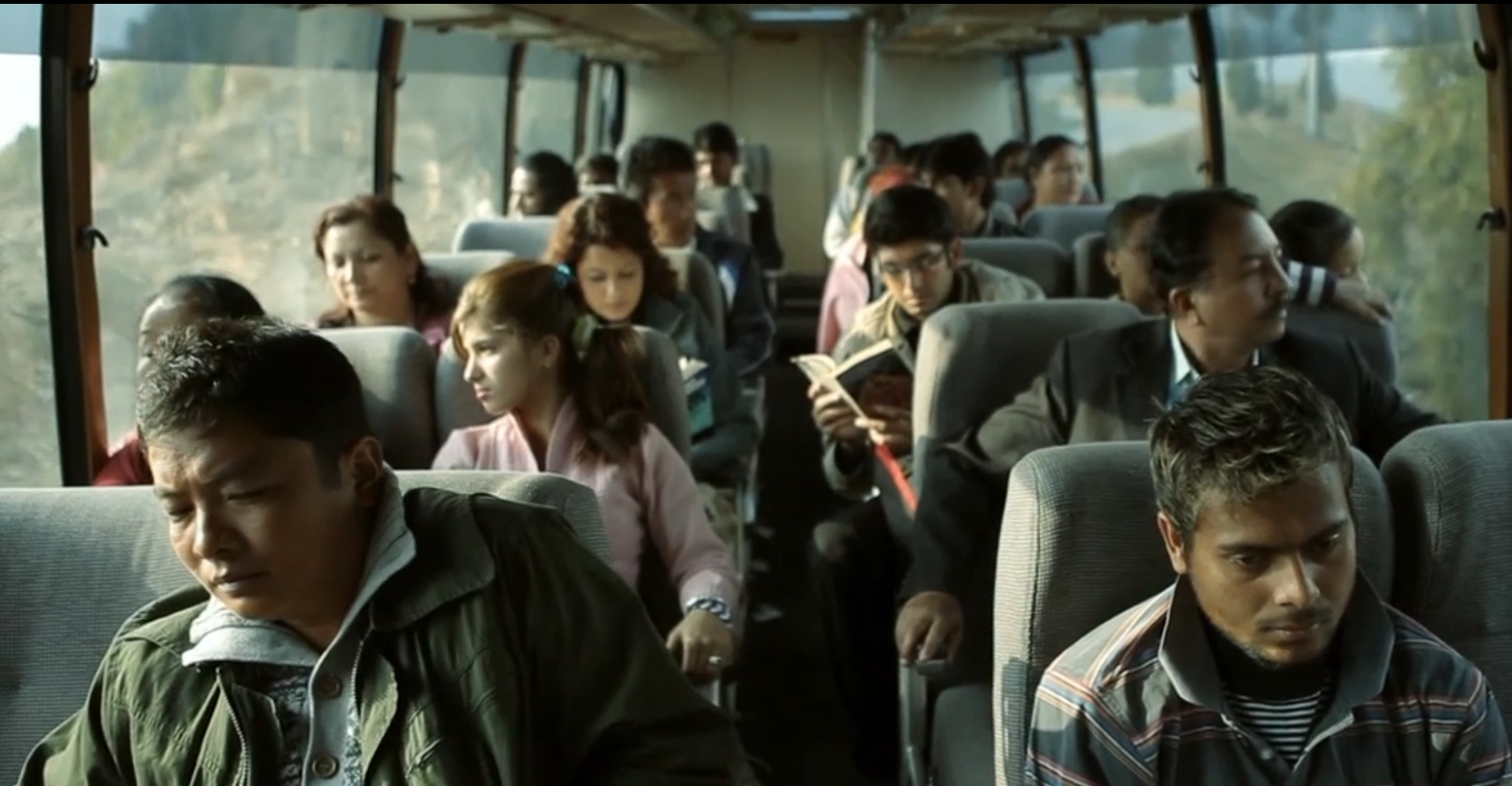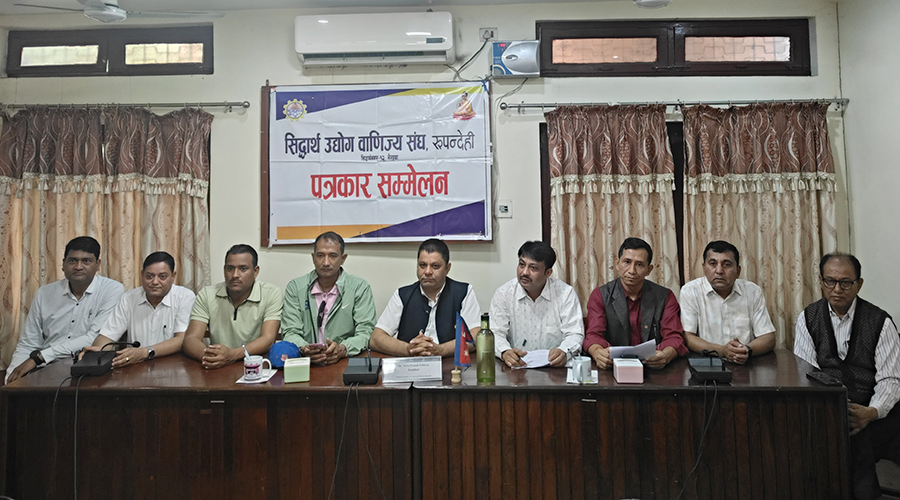
Garud Puran, for Hindus of Nepal, is the scripture that helps departed souls go to heaven safely and inspires the living to follow the right path. But, the movie Garud Puran released this week has nothing to do with heaven or hell.
The title is apparently deceiving as there are not sufficient grounds to give the movie this name. It originates in the name of the ‘band baja kendra’ that the father of a lead character owns. The audience sees the name written on a banner during the first scene, and that is all. There is nothing in the movie that refers to either Garud Band Baja Kendra or the religious text.
It’s not only the title that deceives you, but the entire plot also leaves you bored and baffled. It is poor in evoking emotions in the audience. Instead, the story has been made unnecessarily complicated. Sadly, this movie is also based on a conviction that making people laugh is enough for comedy, and the ‘artists’ can do any artless trick to achieve that.
Faulty presentation of inevitable realities
The viewers sense faultiness in the story in the first scene—whereas one of the character’s overseas ticket is not yet fixed, his parents throw a party to celebrate the occasion. This is ridiculous and senseless.
Garud Puran is based on the themes of lust for sex and money, and crimes that take place when people cannot control their want for the two. Whereas sex, money, and crime can move members of the public easily as they are inevitable realities of the human race, they turn boring when they are presented in the movies without considering the story’s artistic worth.
This movie’s presentation of sex and love is overtly dirty. Renbo, one of the characters, is not only desperate to ‘lose his virginity’; he compares the size of his genitals with that of others. Then, there is a quack, in the guise of a sadhu, who opens his ‘clinic’ in the open, cheating men in the pretext of helping them boost their libido.
This is faulty, mainly due to two reasons. First, the idea of a sadhu opening a sex clinic in Kathmandu is unrealistic. People like Renbo, given his background knowledge about various issues and social involvement, do not go to a sadhu, seeking suggestions about sexual power. Second, open discussion of sexual matters in a movie that targets the general audience itself is a cheap idea unless the intention is educating people; because sex is entirely a private affair. Many recent film producers have failed to realise this.
It becomes dirtier when words and phrases giving double meanings are used just to make people laugh. Renbo, in his dialogues, uses many such expressions.
Likewise, there is a woman who is ready to leave her committed boyfriend to go with a new acquaintance if he gifts her a fancy mobile set. Since her story is not fully developed, some may think that the movie just tries to devalue the female race.
The use of fake banknotes to pay ransom, intimidations and abduction attempts in order to amass money are also boring techniques of Nepali cinema industry and their artless exposure is pointless.
Knotty plot
Whereas the first half of the movie is full of dirty content, the second half is unnecessarily knotty. There is a complex cycle of payable loans, like A has to pay some money to B, B to C and C to D. The entanglement deepens when the protagonists and antagonists plan to abduct key members of each side. As everyone runs after money, some aides exchange their sides; and the plot becomes more complicated. Likewise, there are some noticeable gaps in the story, which leave the audience confused.
Minutes before the film reaches its dénouement, all key characters of the movie come together. There is a bag containing millions of rupees, which everyone wants to snatch and run away. The scene is so boring that almost everyone gets the bag at least once, but immediately throws it away due to their inability to keep it safe. The scene looks like a children’s ball game, in which the player needs to hold the ball to get points.
But, why everyone is running after that bag is a mystery. If it is just because it has money, a commercial film showing the struggle is lame and childish.
Then, it suddenly ends with a statement by Renbo, who says he received all the money. As the friend of ‘the hero’ emerges as the ‘real hero’ because he has got hold of the money, the hero disappears. Ultimately, the viewers cannot comprehend who the hero is, and what the movie wants to show.
Average acting and cinematography

Najir Hussain and Karma, who entered the cinema world after their successful performances in theatre, have done a fair job in the movie. Hussain’s acting looks quite artificial in the beginning, but it improves as the story progresses. Karma’s acting is okay, but the characterisation of his role is problematic. Kameshwar Chaurasiya, Prabin Khatiwada and Prakash Ghimire’s acting is average.
Given that it is her first appearance on the big screen, Priyanka Singh Thakuri’s performance should be considered fair. Loonibha Tuladhar’s presentation is fantastic as it perfectly suits the role the story demands.
Cinematographically, Garud Puran is an average production. Not a single aspect of the movie leaves an impression on the audience, perhaps because the story itself is poor. The director has forcefully inserted one song in the movie—Ma ta prim ma. It does not have any relevance to the story. Featuring Nishchal Basnet in the song is not justified; he has been employed just to attract his fans.
Verdict
Whether the religious Garud Puran takes you to heaven is questionable, but it is certain that the movie Garud Puran takes its audience and Nepali film industry nowhere. It will get lost behind the curtains after the next few shows.
—
Garud Puran
Runtime: 123 minutes
Genre: Comedy
Director: Subash Koirala
Screenplay: Subash Koirala, Binod Khatiwada, Akash Baral
Cast: Karma Shakya, Najir Hussain, Priyanka Singh Thakuri, Kameswor Chaurasyia, Prabin Khatiwada, Prakash Ghimire, Rashmi Bhatta, Loonibha Tuladhar, Basanta Bhatta
1.5/5

























